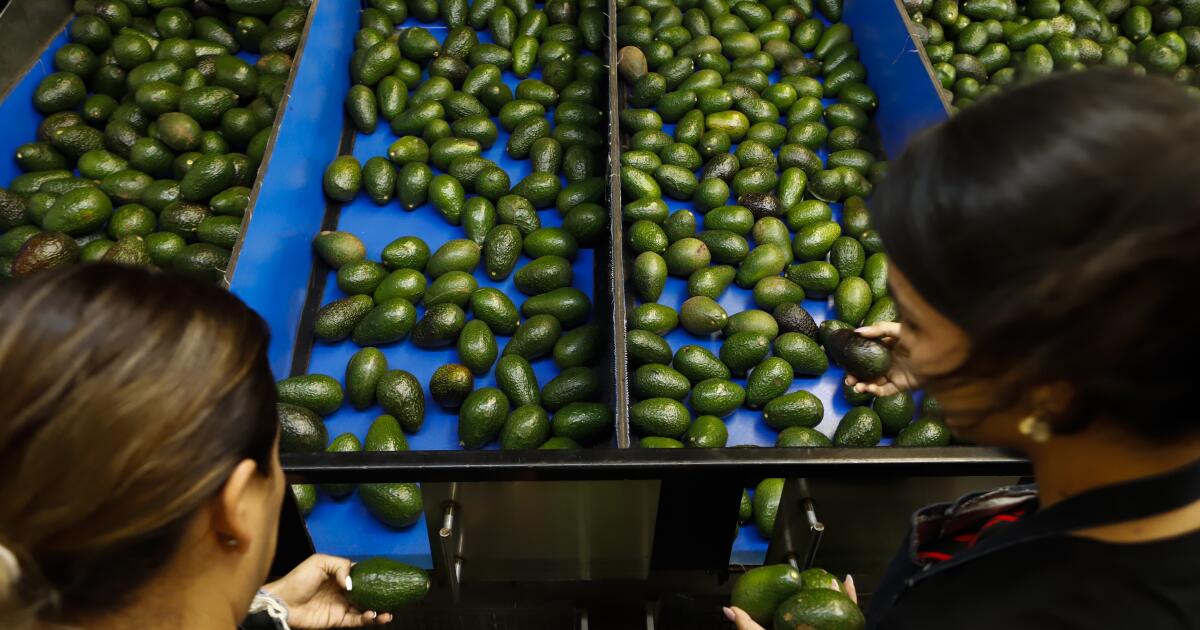The flow of avocados from Mexico to California may slow in the coming days, resulting in tough times for fans of guacamole and avocado toast.
The United States Department of Agriculture said this week it had suspended inspections of avocados and mangoes imported from the violence-hit Mexican state of Michoacan, a move that could ultimately result in higher prices for consumers.
The decision to halt inspections was made after two U.S. Department of Agriculture employees “were recently attacked and detained while they were inspecting avocados in the state of Michoacan,” U.S. Ambassador Ken Salazar said in a statement. Salazar said the employees are no longer in captivity, though he did not say how they were freed.
It’s unclear when inspections will resume. The USDA wrote in a statement to The Times on Tuesday that “programs will remain suspended while the safety situation is reviewed, and protocols and safety measures for (Animal and Plant Health Inspection Service) personnel will not be implemented.”
The move will not affect avocados and mangoes that are already headed to the U.S. Salazar said the ban will also not affect fruits and vegetables coming from other Mexican states.
Although the U.S. has not provided much information about the nature of the incident, Michoacan Governor Alfredo Ramírez Bedolla told Mexico’s Radio Formula that the incident began Friday when a vehicle carrying two inspectors was stopped — along with other vehicles — during a protest in the town of Paracho. The governor said the two inspectors were never in danger or detained and soon went on their way.
“This was not a criminal act committed against the inspectors,” the governor said. Protesters in Mexico regularly block roads as a form of protest against the government, organized crime or other entities. The governor expressed confidence that inspections would resume soon. Michoacán produces more avocados than any other Mexican state.
“My government is providing all necessary security support to the inspectors,” the governor told Radio Formula.
It’s not the first time U.S. safety inspectors have encountered problems in Michoacan, where the billion-dollar avocado industry has become a prime target for cartels that levy heavy taxes on growers and plant their own orchards to harvest what locals call “green gold.”
More than a dozen criminal groups in Mexico are vying for control of the avocado trade, preying on wealthy orchard owners, the workers who pick the fruit and the drivers who truck it to the United States. Parts of Michoacán now resemble a veritable war zone, with gangs boasting powerful arsenals that include grenade launchers, drones equipped with explosives and tank-like vehicles known as “Monsters” equipped with machine gun turrets and steel armor.
American inspectors often find themselves caught in the middle. Two years ago, The US suspended avocado imports from Michoacán after a plant safety inspector was threatened. That suspension was lifted less than a week later. In December 2020, the US stopped importing avocados from a region of Michoacán for a month after an armed group burned a shipment of avocados, Mexican officials said.
Salazar said he plans to travel to Michoacan next week to meet with Ramirez and the Mexican Growers and Export Packers Association to discuss the safety issue.
Mexican President Andrés Manuel López Obrador said on Tuesday that his government was working with the Americans to resume inspections.
“Fortunately we have a good relationship and we are trying to convince them to do things differently, but it takes time,” he said.
Avocado has become a popular dish staple in the diet Many Americans eat this creamy fruit by spreading it on toast and mixing it into guacamole. Experts say Mexico’s efficient production of this crop has largely benefited consumers — in their cuisine and in their wallets.
In 2023, the United States imported a record 2.78 billion pounds of fresh avocados, with 89% of that volume imported. Coming from Mexico. California growers, who specialize primarily in Hass AvocadoThe United States produces the majority of fruit grown in the United States, accounting for about 10% of the country’s consumption.
The California Avocado Commission estimates that California growers will grow 233.1 million pounds of avocados in the 2022-23 season. Officials predict 208 million pounds will be produced this season, which would be the smallest crop since 2008, according to a report The USDA Outlook report was published in March.
Fresh avocado imports totaled nearly $3 billion last year, ranking second in fresh produce import value to the U.S. after tomatoes.
Daniel Sumner, a professor of agricultural economics at UC Davis, said the impact on consumers will depend on how long inspections are halted.
“If this goes away quickly, the market could slow down a little bit,” he said. “If this goes on for several weeks, we’re probably going to see a lot fewer avocados.”
Sumner said if the inspection ban continues, people should be prepared for a hike in avocado prices. He said stores and restaurants may stop buying the fruit their customers want.
“It’s a natural thing to happen. Things are rationed based on price,” Sumner said.















